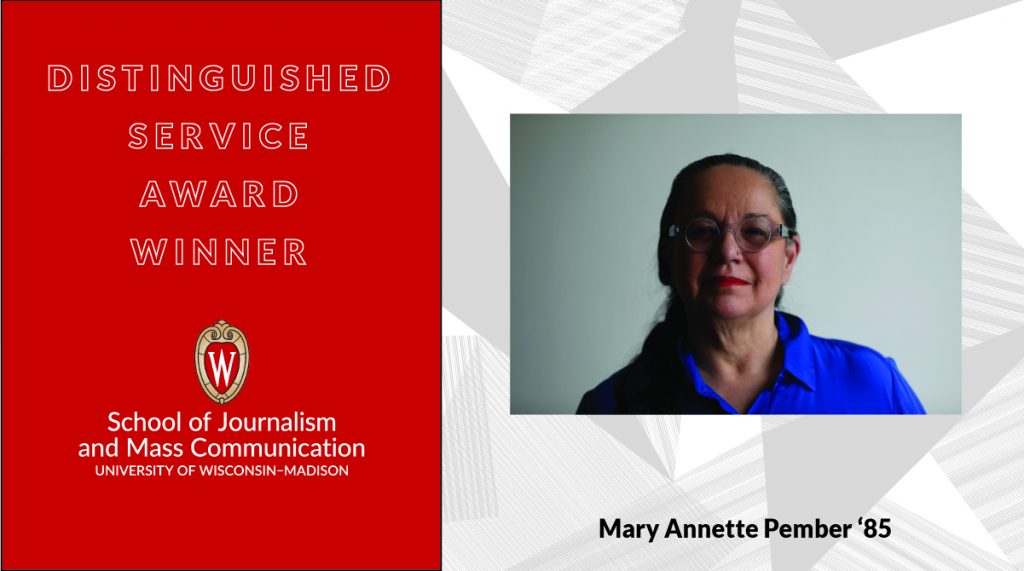
By Emily Knepple
Mary Anette Pember is a 1985 J-School graduate and currently, a national correspondent for Indian Country Today. Pember was a 2020 recipient of the Ida B. Wells Fellowship, which aims to “create a pipeline of investigative reporters of color who bring diverse backgrounds, experiences and interests to their work”. Her current clients include The Washington Post, The New York Times, The Progressive Magazine and the National Park Service. Pember’s time in the J-School allowed her to dive deeper into her interests.
Tell us about your career path.
Although I love photography I really always wanted to write but didn’t have the confidence. Photography has always been about the storytelling element for me, photos are simply additional tools for telling a story. After a few years I grew more interested in the writing component so embarked on a freelance writing career in addition to the photography in 2003. My work has focused on Native issues and people, telling the stories that are often overlooked or not viewed as important by mainstream media. I received great on the job training from fellow journalists during my newspaper career in addition to gaining excellent contacts to reach out to for help in the transition to writing. I continue to shoot both stills and videos with my stories.
What are you focused on right now?
Right now, focusing on keeping up with the daily news cycle as I work for Indian Country Today as a national correspondent, also looking at a book project, part memoir, part historical about my mother’s boarding school experience.
What lessons from your J-School education helped you in your career?
Never be afraid to ask questions
What other activities were important to your time at UW?
Art classes in design and photography were an excellent addition to journalism. I also loved classes with Gerda Lerner in women’s history, Ada Deer in social work, Betsy Draine in English, Tino Balio in film and so many others. I loved to run along the lakeshore path and hang out with friends at the Union.
If you were to look back and give your college self a piece of advice, what would it be?
Be bold, step forward and don’t worry about what others think of you.
How has a J-School degree been important in your current work?
People and employers take a journalism school degree seriously.
What does UW–Madison mean to you?
Going to university at UW was one of the greatest experiences of my life, I was so hungry for knowledge and new experiences outside of my home and upbringing. Madison gave me permission to look beyond my birth.
Hardest J-School class you ever took?
Reporting.
Hardest J-School assignment you ever had?
Don’t recall, maybe covering a city election.
Best Madison hangout?
The 602 club, now gone.
Favorite place in Vilas Hall?
I didn’t really hang out in Vilas Hall to be honest. I didn’t feel super welcomed in the predominately white male space. However, there were some standouts in the J-School who I credit with helping me stay in school. Susie Brandscheid, assistant to director of the J-School, consistently made a point to reach out to me and notify me of opportunities or just ask how I was. I recall one semester when I was flat broke and looking at having to drop out. JoAnn Jones, a Ho-Chunk grad student who subsequently went on to lead the tribe as chairwoman, suggested I reach out to my department. I went to see Susie and somehow she found a $500 grant for me from the Milwaukee Journal, allowing me to continue. I also recall reporting Professor Ray Anderson’s praise and support of my writing. I was in awe of him as a former New York Times reporter and couldn’t believe he thought I could write. Overall, however, I made my own way as a photojournalist. I took design and photography classes in the Art Department, which actually was very helpful. I recall overhearing other J-School students sharing that the photojournalism professor was very unhappy about my gaining an internship as a photojournalist at a local paper. He was critical of the internship since it was aimed at students of color and disparaging me because I wasn’t “one of his students.” I hadn’t taken classes with him, and the paper hadn’t consulted him in their choice. As a Native woman, I was an outsider in the J-School milieu and at UW in general. But, I had a few key people in my academic life who made all the difference. Plus, knowing early on I would always be an outsider in the mainstream media world was an important lesson and helped me navigate future work situations.